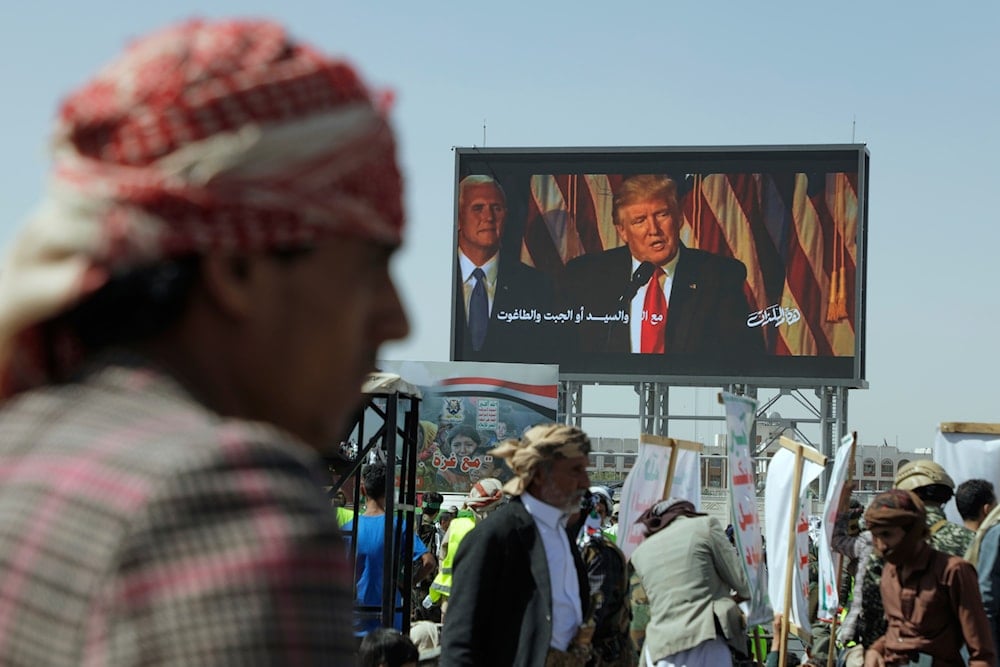US campaign against Yemen was 'costly', 'futile': National Interest
A National Interest op-ed by Will A. Smith explores Trump's aggression against Ansar Allah in Yemen, concluding it was a campaign bound to fail before it started.
-

Ansar Allah supporters chant slogans during a weekly anti-US and anti-"Israel" rally under a banner criticizing President Donald Trump, in Sanaa, Yemen, Friday, May 16, 2025 (AP)
The United States' aggression on Yemen was fruitless and extremely costly, and US President Donald Trump should "resist pressure to reengage," Will A. Smith wrote in a National Interest op-ed published on Monday.
The opinion piece highlighted that when the United States launched Operation Rough Rider against Ansar Allah in mid-March, the Yemeni group was primarily targeting "Israel" rather than US ships, and despite an expenditure of approximately $1 billion, the Yemeni Armed Forces were still focusing their operations on "Israel" and not American vessels.
Smith emphasized that the US President Donald Trump made a good choice: ceasing the aggression, which was both expensive and carried the risk of escalation.
He emphasized that as Ansar Allah operations against "Israel" persist and criticism grows even among some of Trump's allies, there is a significant risk that Washington could be pulled back into the conflict. Yet, the administration must resist the pressure to "finish the job" and remain committed to its decision to disengage from the campaign.
Billion-dollar blunder
The aggression against Ansar Allah was unnecessary for US interests and destined to fail, Smith wrote, especially as US bombings couldn't eliminate their threat capabilities.
Furthermore, he highlighted that international shipping companies refused to return to the Red Sea before the war on Gaza ends.
The aerial bombardment against Ansar Allah was swiftly revealed to be ineffective following the launch of Operation Rough Rider: even after a month of nearly uninterrupted strikes, US forces had not achieved air dominance while YAF operations persisted, leading CENTCOM to highlight weapons expenditure rather than actual battlefield results as their primary metric of progress.
Trump's annihilation vow 'unrealistic'
Smith emphasized that Trump's vow to "completely annihilate" Ansar Allah was always unrealistic, given both the historical record of air power's limitations against militant groups and the United States' demonstrated inability to achieve such absolute victories through bombardment alone.
He highlighted that Ansar Allah had endured years of Saudi-led coalition airstrikes by developing resilient weapons dispersal and replacement systems. No amount of US bombardment duration or target selection could ever have fully eliminated their capacity to threaten shipping lanes from the air.
The US military campaign against Ansar Allah severely strained the former's critical defense resources: the accelerated depletion of precision-guided munitions and prolonged deployment of carrier strike groups to Yemen not only compromised America's strategic focus on the Indo-Pacific but also reversed years of efforts to reduce military commitments in the Middle East.
The US found itself trapped in a lopsided exchange, expending multimillion-dollar missiles to eliminate cheap drones, further stressing an already overburdened defense supply chain.
Risk of escalation
The most alarming development, as Smith highlighted, was the escalating danger of mission creep, particularly after leaked CENTCOM plans revealed in The New York Times proposed an Israeli-style assassination campaign lasting eight to ten months.
As airpower alone failed to deter or end Ansar Allah, US officials weighed backing Yemeni opposition forces; a risky escalation that could have spiraled had the group's repeated near-fatal operations on American troops succeeded, as per recent reports.
The continued Ansar Allah operations on Israeli targets and the sustained Red Sea shipping disruption will fuel growing demands for renewed US strikes, Smith highlighted, as Washington’s ceasefire faces bipartisan criticism.
Gaza ceasefire remains the only answer
The path to ending Ansar Allah's hostilities lies not in repeating ineffective airstrikes but in brokering a Gaza ceasefire, an approach Smith advocated as the only realistic solution after the previous campaign's demonstrated futility and financial waste.
Yemen asserted that its operations intend to pressure "Israel" into a ceasefire in Gaza, and this is evidenced by their pause in operations in January, Smith argued.
Smith concluded by noting that while the ceasefire with Ansar Allah does not excuse the Trump administration's misguided campaign, credit is due for recognizing the strategy's failure and ultimately abandoning it.
"Too often, sunk-cost thinking, concerns about 'credibility,' and fears of political backlash have prevented leaders from cutting their losses," he stated, adding that "...Trump smartly walked away. Now, he must face down calls to reengage in a futile endeavor."

 4 Min Read
4 Min Read










